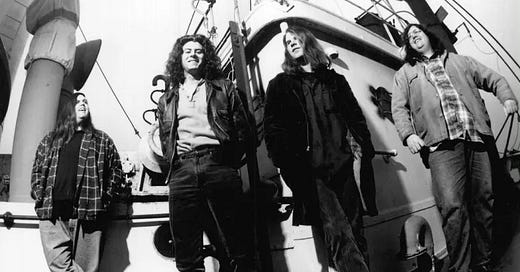The Screaming Trees | History of the Band
Beyond the Shadows: The Profound Influence of Screaming Trees on the Grunge Movement of the 90s
Formation and Early Years
Formed in 1984 in Ellensburg, Washington, Screaming Trees emerged from a mix of '60s psychedelia, garage rock, and punk influences. The original lineup consisted of Mark Lanegan (vocals), Gary Lee Conner (guitar), Van Conner (bass), and Mark Pickerel (drums), who Barrett Martin later joined. By signing with Epic Records in 1990, the band transitioned from the independent scene to mainstream visibility.
Eric Peterson suggested this artist for a future Dig Me Out podcast episode. Each month, our Patrons are presented with a selection of albums suggested by listeners and asked to vote for their favorite. The album with the most votes is given another minute in the spotlight. Vote and share your thoughts.
Musical Style and Evolution
Screaming Trees' sound, deeply rooted in neo-psychedelia and grunge, evolved over the 1990s. Their music was distinguished by Gary Lee Conner's guitar work, often compared to the atmospheric styles of Syd Barrett and Black Sabbath and Lanegan's distinctive, gravelly vocals. This combination gave their music an otherworldly quality, blending aggressive, bittersweet, and trippy elements that reflected their diverse influences.
Discography and Notable 90s Albums
During the 1990s, Screaming Trees released several significant albums:
"Uncle Anesthesia" (1991): This album marked their major label debut with Epic Records, featuring hits like "Bed of Roses." The album showcased the band's unique blend of grunge and psychedelia, receiving praise for its powerful songs and atmospheric depth.
"Sweet Oblivion" (1992): A breakthrough album featuring the hit single "Nearly Lost You," which gained MTV rotation and chart success. It epitomized the grunge era's sound and became the band's most commercially successful release.
"Dust" (1996): Leaning towards classic rock and psychedelic rock, "Dust" was polished and showcased a matured sound. Despite favorable reviews, it did not achieve the commercial success of "Sweet Oblivion".
Critical Reception
The band's work in the 1990s was met with commercial success and critical acclaim, particularly for "Sweet Oblivion." Critics highlighted the band's ability to blend raw neo-psychedelia with the grunge movement's energy. However, despite their contributions, Screaming Trees often remained overshadowed by their Seattle peers.
Influence and Legacy
Screaming Trees’ legacy extends beyond the band. Mark Lanegan, the lead vocalist, had a successful solo career and collaborated with Nirvana and Queens of the Stone Age. Lanegan's unique vocal style enriched QOTSA's sound, and his versatility extended to his collaborations with Greg Dulli, Soulsavers, and others. Barrett Martin, the drummer, played on albums by R.E.M., Queens of the Stone Age, and Luna, showcasing his versatility. These collaborations highlight the significant impact of Screaming Trees members on the music industry.
Conclusion
The Screaming Trees' journey through the 1990s is a testament to their creativity, resilience, and music's enduring appeal. They carved a unique niche from their early days in Washington to their critical acclaim and influence on the grunge movement. Despite the challenges and changes in lineup and style, their work from this era remains a significant and beloved part of the '90s music landscape.
Sources
Wikipedia
AllMusic
Return of Rock
Altpress
mxdwn Music






Thank you for remembering them. The Trees did the greatest live concert I ever saw. They get far less credit than they should for being a great rock n' roll band; over and above all the "genres".